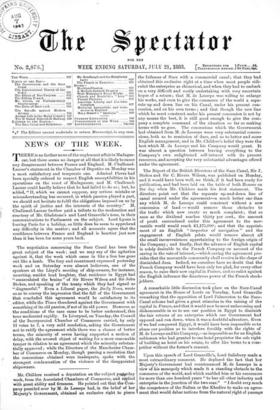Upon this speech of Lord Granville's, Lord Salisbury made a
most extraordinary comment. He deplored the fact that her Majesty's Government had countenanced M. de Lesseps in a view of his monopoly which made it a standing obstacle to the commerce of the world, and which enabled him or his successors for more than one hundred years "to bar all other industry and enterprise in the junction of the two seas." "I doubt very much the competence of the Sultan or the Khedive to make an agree- ment that would debar nations from the natural right of passage
across the Isthmus of Suez for the commerce of the world. Sup- posing there had been some improvement in the Dardanelles or the Cattegut, would it have been within the competence of the Sultan's Government or the Danish Government to place an artificial limit on the passage of the commerce of the world P" Well might Lord Selborne reply that Lord Salisbury seemed to speak "as if the Isthmus of Suez, before the Canal was made, had been a natural maritime highway and channel for the commerce of the world, as if it had not been any part of the Egyptian territory, as if no territorial concession had been re- quired for it." Why, if Lord Salisbury's line of argument has any force in it, France and Germany would have the right to make a second line of the Clyde and Forth Canal, against the will of the British Government, and without reference to the rights of the owners of the present Canal.



































